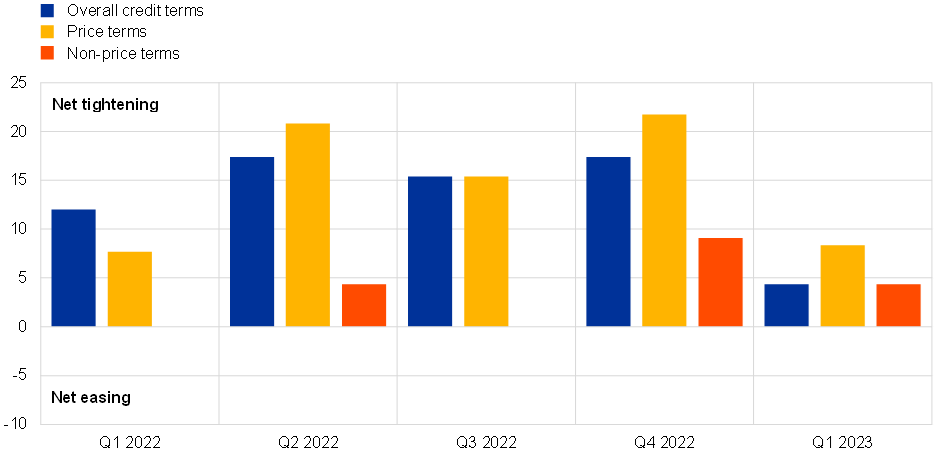- PRESS RELEASE
Results of the March 2023 Survey on credit terms and conditions in euro-denominated securities financing and over-the-counter derivatives markets (SESFOD)
12 April 2023
- Credit terms and conditions tightened for all counterparty types over December 2022 to February 2023 review period and year to March
- Maximum amount and maximum maturity of funding offered against euro-denominated government bonds increased over review period
- Initial margin requirements for most non-centrally cleared over-the-counter derivatives increased over review period
The March 2023 Survey on credit terms and conditions in euro-denominated securities financing and over-the-counter (OTC) derivatives markets (SESFOD) marks the tenth anniversary of this survey. The three-monthly SESFOD is an important input into the ECB’s financial stability and market functioning analyses such as the Financial Stability Review.
On balance, overall credit terms and conditions tightened slightly over the December 2022 to February 2023 review period for all counterparty types. Price and non-price terms tightened for all counterparty types except sovereigns, and in particular for banks and dealers. The overall tightening of credit terms and conditions was mainly attributed to a deterioration in general market liquidity and functioning. It continued the trend reported for the previous seven quarters and was in line with the expectations expressed in the December 2022 survey. Survey respondents expect overall credit terms to tighten further over the period from March to May 2023. The practices of central counterparties, including margin requirements and haircuts, contributed slightly to the tightening of survey respondents’ price and non-price terms. The amount of resources dedicated to managing concentrated credit exposures increased in the December 2022 to February 2023 review period, continuing developments reported since the March 2022 survey round. The use of financial leverage decreased for investment funds and insurance companies over the review period. Hedge funds intensified efforts to negotiate more favourable terms.
Chart 1
Changes in overall credit terms and price and non-price terms offered to counterparties across all transaction types
(Q1 2022 to Q1 2023; net percentages of survey respondents)

Source: ECB.
Note: Net percentage is defined as the difference between the percentage of respondents reporting “tightened somewhat” or “tightened considerably” and the percentage reporting “eased somewhat” or “eased considerably”.
In the case of securities financing transactions, a significant share of respondents reported that the maximum amount and maximum maturity of funding offered against euro-denominated securities had increased for most collateral types, but in particular for government bonds. Survey respondents also reported larger haircuts being applied to high-yield corporate bonds, asset-backed securities and covered bonds, while financing rates/spreads had increased for financing secured against all collateral types, in some cases significantly. In addition, they reported higher overall demand for funding, in particular funding with a maturity greater than 30 days. Liquidity had continued to deteriorate for all collateral types, in particular for high-yield corporate bonds, government bonds and financial corporate bonds.
Turning to non-centrally cleared OTC derivatives, survey respondents reported that initial margin requirements for most of these types of derivative had increased in the December 2022 to February 2023 review period. They reported an increase in the maximum amount of exposure for certain types of credit derivative, although a decrease was reported for commodity derivatives. Respondents reported an unchanged maximum maturity of trades for all types of derivative. Liquidity and trading improved somewhat for foreign exchange and interest rate derivatives but deteriorated for most other types of non-centrally cleared derivative.
The ECB included special questions in the March 2023 survey to look into the longer-term trend. The survey asked respondents to compare credit terms and conditions at the cut-off date of the March 2023 survey round (i.e. end of February 2023) with those reported in the March 2022 round. Compared with the previous year, overall terms and conditions for securities financing and OTC derivatives transactions had tightened for all counterparty types.
The March 2023 SESFOD survey, the underlying detailed data series and the SESFOD guidelines are available on the European Central Bank’s website, together with all other SESFOD publications.
The SESFOD survey is conducted four times a year and covers changes in credit terms and conditions over three-month reference periods ending in February, May, August and November. The March 2023 survey collected qualitative information on changes between December 2022 and February 2023. The results are based on the responses received from a panel of 26 large banks, comprising 14 euro area banks and 12 banks with head offices outside the euro area.
For media queries, please contact Daniel Weber, tel.: +49 172 8344 539.
Notes
- The SESFOD survey first ran in March 2013, see “New ECB survey on credit terms and conditions in euro-denominated securities financing and OTC derivatives markets”, press release, ECB, 30 April 2013.
Europos Centrinis Bankas
Komunikacijos generalinis direktoratas
- Sonnemannstrasse 20
- 60314 Frankfurtas prie Maino, Vokietija
- +49 69 1344 7455
- media@ecb.europa.eu
Leidžiama perspausdinti, jei nurodomas šaltinis.
Kontaktai žiniasklaidai

